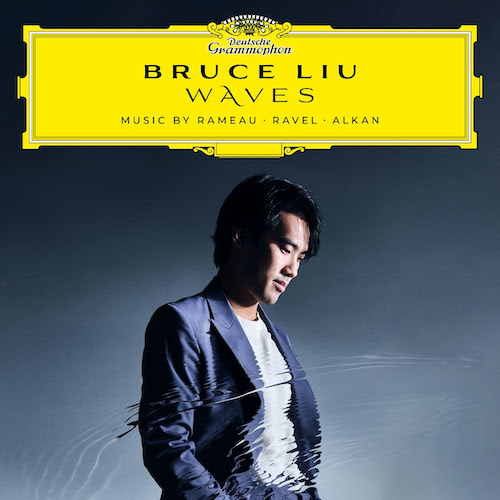DG recordings from four celebrated pianists to close the musical year

Rachmaninoff: Piano Concertos Nos. 1-4; Rhapsody on a Theme of Paganini. Yuja Wang; Gustavo Dudamel/Los Angeles Philharmonic (Deutsche Grammophon, 2 CDs)
“For Clara.” Music of Schumann and Brahms. Hélène Grimaud (Deutsche Grammophon).
Bach: Goldberg Variations. Vikingur Olafsson (Deutsche Grammophon).
“Waves.” Music of Rameau, Ravel and Alkan. Bruce Liu (Deutsche Grammophon).
The end of another year means, among other things, clearing off a coffee table piled high with review discs from the past twelve months. Four Deutsche Grammophon releases from a quartet of celebrated pianists are worthy of note, even if the rewards prove decidedly mixed.
Yuja Wang began the year with a marathon concert at Carnegie Hall of all five of Sergei Rachmaninoff’s works for piano and orchestra to kick off the composer’s 150th anniversary year. That event with the Philadelphia Orchestra, received raves (and wound up high on New York Classical Review’s Top Ten List for 2023). A week later she repeated the event—though not in one day as in New York—with Gustavo Dudamel and the Los Angeles Philharmonic, and made the present recording.
Maybe they should have released the Carnegie performances instead, for this set of Wang’s Rachmaninoff proves frustratingly uneven. The first disc starts off well with Wang keeping the youthful First Piano Concerto in scale with thoughtful phrasing in the slow movement and plenty of her flame-throwing (yet note-perfect) virtuosity. Yet the Rhapsody on a Theme of Paganini is surprisingly prosaic. The pianist is characteristically in synch with the quicksilver light virtuosity of the piece, though some tempos are more stately than one would expect. The soaring 18th variation is plainspun and Wang makes little of the witty solo throwaway at the coda. The Fourth Concerto is better but all the performances suffer from a surprisingly muted, subfusc recording—boomy in tuttis and with little brilliance on top.
Significantly, the Second and Third Concertos are much more successful, perhaps because these are the Rachmaninoff works Wang performs most often. Here the mercurial Chinese pianist’s playing is more tempered and flexible in a rhapsodic performances of No. 2—the highlight of the set—with a notably eloquent Adagio. Dudamel and the orchestra are at their best here and in No. 3 as well.
Wang’s legion of fans won’t hesitate but those looking for a more consistent complete Rachmaninoff concerto set should stick with Vladimir Ashkenazy (his first cycle with Andre Previn on London) or Stephen Hough (Hyperion).

Hélène Grimaud, who will perform at Symphony Center February 4, shows her refined musicianship in a recent disc of Schumann and Brahms. The former’s Kreisleriana is played with elegance and finesse but with little sense of the music’s emotional volatility. Seven of the nine sections are marked “sehr” (“very”) yet that crucial emphasis is largely ignored in a too-well-tempered performance that takes much of the inherent wildness out of the music.
Brahms’ Op. 117 Intermezzi fare better. The disc concludes with Brahms’ Op. 32 Lieder und Gesänge. Konstantin Krimmel has a pleasing light baritone and is sensitive to the gently melancholy texts, but the balance often pushes the singer into the background—like the booklet, which has full texts and translations but no photo or bio of Krimmel— making these nine songs sound like a work for piano with obbligato singer.
Fortunately, the two remaining piano discs from the esteemed yellow label offer more consistent rewards.

In his disc of Bach’s Goldberg Variations, Víkingur Ólafsson shows the same impressive artistry that made his Chicago debut last May a Top Ten performance for 2023.
The Aria theme is played spaciously and the first variation is bracingly fleet. Some of the playing is dazzling, at times recalling Glenn Gould’s celebrated 1955 recording. Yet while the Icelandic pianist gives the impression of serious thought taken with his tempo and dynamic decisions, there is nothing pedantic. Ólafsson’s performance has ample charm as well as bravura; even the knottiest counterpoint has fine rhythmic clarity and the Aria reprise provides a sense of coming full circle. A fresh, intelligent and communicative Goldbergs in excellent modern sound.

The sensitive artistry of Bruce Liu, winner of the 2021 International Chopin Competition, is on full display in “Waves,” his debut studio album with an offbeat program of Rameau, Alkan and Ravel. In Rameau’s Gavotte and Six Doublee, Liu brings fine delicacy and shaded, stylish playing to Rameau that makes instrumentation issues irrelevant. Liu invests a strikingly differentiated character to each variation. In four shorter Rameau works, Liu brings lovely intimate expression to Les tendresse plaintes and piquant charm to the Menuet I & II. Les cyclopes is spirited yet not overdriven and in La Poule Liu puts across the pecking rhythms of the title hen with understated wit.
Of the two Alkan pieces, the Barcarolle is flowing and subtly phrased and shaded. In Le festin d’Ésope, Alkan subjects a rather ditsy theme to 25 variations in a packed ten minutes. Liu mines great humor and freewheeling character out of these far-flung variations.
Best of all is Ravel’s Miroirs, where Liu brings his Chopin sensitivity to Ravel’s variegated portraits, from a flowing and limpid “Nocturelles” and rapt “Oiseaux tristes” to the drama of “Une barque sur l’ocean.” “Alborada del gracioso” paints a lively and characterful jester, and the concluding “La vallee des cloches” receives a rendering of spacious and deep expression.
Bruce Liu will make his highly anticipated Chicago debut June 2 at Symphony Center but in the meantime, the Canadian pianist’s superb musicianship on this disc will likely find him many new admirers.